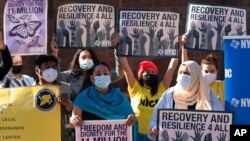President-elect Joe Biden is expected to reverse many of President Donald Trump’s landmark immigration policies after he takes office next year. Though untangling some immigration guidelines most likely will take time, Biden has vowed to reverse limits on temporary workers, loosen visa restrictions on international students, halt border wall construction and end private immigration detention centers.
As VOA recently reported, Biden is expected to prioritize restoring DACA — an Obama-era program that protects undocumented immigrants who were brought to the U.S. as children from deportation — rescind travel restrictions on 13 countries and put in place a 100-day freeze on deportations while his administration issues new guidance.
Temporary workers and international students
When it comes to temporary workers and international students, where H-1B and F-1 visas allow nonimmigrants to live and work temporarily in the U.S. under certain conditions, experts said they believed the new president would overturn some of the restrictions implemented in the last four years.
But Sarah Pierce, policy analyst at the Migration Policy Institute, a nonpartisan organization in Washington that researches immigration policy, noted that immigration matters might not be at the top of Biden’s to-do list during a pandemic that continues to inflict economic damage.
"A lot of legal immigration stuff might move slower just because they have so much to do. … But I would expect them to be friendly to H-1Bs … and to, at the very least, walk back the restrictions put on by the Trump administration,” Pierce said.
Citing a need to protect American workers, the Trump administration signed an executive order to limit legal immigration and the issuance of temporary work visas. In November, the White House released another order restricting H-1B jobs by tightening the definition of “specialty occupation” that qualifies a foreign worker to be hired. Meanwhile, the Department of Labor released a rule increasing the minimum wages and salaries U.S. employers must pay foreign workers by 30%.
For F-1 visas, Biden’s campaign website does not specifically mention international students. But those studying in the U.S. hope for fewer restrictions during a Biden administration.
Under Trump, student visas were limited in number and duration, leaving some international students uncertain as to whether they could continue their studies without interruption.
Border wall
Five days after taking office in 2017, Trump signed an executive order to build a new wall along the U.S.-Mexico border. As of October, the administration had completed more than 400 miles of new and replacement fencing.
Biden is expected to end the “National Emergency” designation that redirected congressionally appropriated funds for the Department of Defense to build sections of wall along the southern border.
While Biden has pledged to halt further wall construction, some work may continue to complete contracts already signed. Completed wall sections are not expected to be torn down.
Detention centers and immigration courts
Biden's policy recommendations state that migrant detention should be a last resort, not the norm, for those awaiting adjudication.
“We will end for-profit detention centers and ensure that any facility where migrants are being detained is held to the highest standards of care and guarantees the safety and dignity of families. Detention of children should be restricted to the shortest possible time, with their access to education and proper care ensured,” the document says, adding that immigration judges must operate “free of inappropriate political influence.”
Pierce said the Trump administration has prioritized speeding up immigration court proceedings and increasing the number of deportation orders issued.
“But some of the decisions issued by [former Attorney General Jeff] Sessions actually made immigration judges' lives harder,” she added. “It took away some of their discretion and gave them less ability to manage their dockets.”






